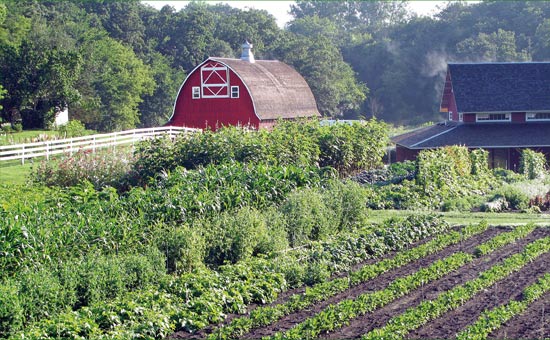Seed Savers Exchange: Maintaining a living legacy
By Arianne Pfoutz
Published: December 28, 2013
Category: Non-GMO Company Profiles
 To access all the articles in this month's issue of The Organic & Non-GMO Report, SUBSCRIBE NOW.
To access all the articles in this month's issue of The Organic & Non-GMO Report, SUBSCRIBE NOW.
Coming from someone strongly committed to organic farming and sustainable living, the comment at first seemed incongruous and even a bit “Pollyanna.” “The whole controversy surrounding GMOs has had a positive effect,” she said. Then she explained: “It has brought attention to seed.”
For Diane Ott Whealy, co-founder and vice president of Seed Savers Exchange (SSE), everything centers on seed. “Because of growing awareness about genetically modified seed, people now know more about hybrids and seed saving,” she said. “With biotech companies barring seed saving and producing potentially dangerous seeds, gardeners are keen to find truly healthy seeds, grow them and save them.”
SSE’s mission is to conserve and promote America’s culturally diverse but endangered garden and food crop heritage for future generations by collecting, growing, and sharing heirloom seeds and plants.
Preservation for Posterity
In the wake of challenges to food security from biotech monocropping, climate change, habitat loss, and dwindling numbers of seed-saving small farmers, Seed Savers’ work preserving genetic resources is helping to stave off a global food calamity. The company maintains over 24,000 documented, endangered varieties at its 890-acre certified organic farm in Decorah, Iowa. Heritage Farm is one of the largest and most diverse farms in the country, with 70 staff members maintaining over 30 organic, non-GMO gardens where the heirloom, open-pollinated varieties are grown out.
“In general, heirloom seed is strong and adaptable—it’s healthier seed to begin with,” Diane said. “During the recent drought in Iowa, nearly all of the state’s corn was severely affected—it’s a single genetic type. But none of ours was. Genetic diversity brings safety.”
Circulating the Seeds
SSE’s colorful seed catalog is distributed to over 250,000 gardeners each year (it’s also online); catalog sales fund maintenance of SSE’s seed collection. “Every seed has a story, and the catalog is a beautiful ambassador for our work,” said Diane.
Those who join as members receive the Seed Savers Exchange Yearbook, filled with more than 12,000 heirloom varieties which more than 13,000 members share with one another through networking. “Regional networking is important—it’s helpful to know what seeds work well in certain climates and conditions,” Diane said.
SSE has distributed hundreds of thousands of heirloom and open pollinated seeds over the last 38 years – now used by seed companies, small farmers, chefs, and home gardeners. This “participatory preservation” method keeps the heirloom varieties circulating, stewarding seeds for the next generation.
“We don’t want the seeds sitting in a vault, we want them grown again in gardens—that’s the best way to preserve them,” Diane said.
Heritage Farm: a “living legacy”
In addition to certified organic heirloom vegetables, the farm also maintains heirloom fruit, flowers, and livestock. It is a model “living” museum, encompassing the gardens, eight miles of hiking trails, a large visitor center, and a library containing current and “heirloom” volumes on agriculture, horticulture, and biodiversity.
A Children’s Garden features traditional garden art; Diane’s Display Garden is an edible landscape mixing flowers, herbs, prairie plants and vegetables; and the Trial Gardens represent the “living catalog” where seed varieties are tested. The Historic Apple Orchard contains 550 different varieties.
The striking Ancient White Park Cattle, which roamed the British Isles over 2000 years ago, greet visitors to the farm, along with heritage poultry.
Grandpa Ott’s seed: Our story begins
Raised on a small dairy farm in NE Iowa, Diane learned early on the importance of gardens for food. Her parents were sustainable farmers, but her grandparents went even further. “They fed nine kids completely off the land,” said Diane. She recalls the magic of touring their gardens at the start of each visit, then sitting on the front porch closed in by a wall of morning glories.
Diane married Kent Whealy and moved back to Iowa. Shortly before her grandfather died, he gave her a pillbox containing seeds from Bavaria, brought by his parents when they immigrated to St. Lucas, Iowa in the 1870s. They are now in the catalog as popular items Grandpa Ott’s morning glory and German pink tomato.
“The story would have been lost if he hadn’t given me the pillbox,” she says. She and Kent started Seed Savers Exchange in 1975 to honor the tradition of saving heirloom seed.
The Power of Seed
The surge of interest in home and community gardening highlights the desire for more self-sufficiency around food. “People are trusting the mainstream food supply less and less,” Diane noted. “They want to know where their food comes from, down to the seed.”
SSE is focused on fulfilling that thirst for more knowledge. Diane is excited that she will be featured in the documentary Seeds: The Untold Story coming out next April.
“Getting this seed growing again—it’s the best defense against challenges from industrial seed companies,” she added. “In the face of powerlessness, we CAN control what we grow in our gardens—we have the choice.”
© Copyright The Organic & Non-GMO Report, December 2013/January 2014




